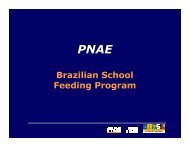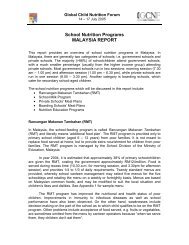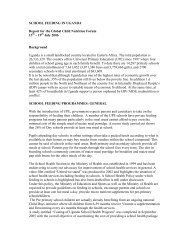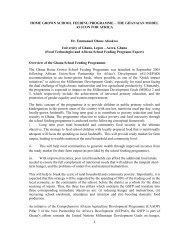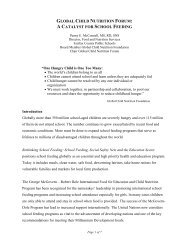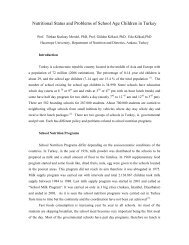EXECUTIVE SUMMARY - Global Child Nutrition Foundation
EXECUTIVE SUMMARY - Global Child Nutrition Foundation
EXECUTIVE SUMMARY - Global Child Nutrition Foundation
You also want an ePaper? Increase the reach of your titles
YUMPU automatically turns print PDFs into web optimized ePapers that Google loves.
Scaling Up Sustainability: Linking School Feeding with Agriculture<br />
Development to Maximize Food Security<br />
May 3-7, 2011<br />
Nairobi, Kenya<br />
Country Perspectives: Implementation and Community<br />
Participation<br />
■ Speakers: Philomena Chege (Moderator), Ministry of Agriculture, Republic of Kenya<br />
Irene Messiba, Ministry of Local Government and Rural Development, Ghana<br />
Zuberi Samataba, Ministry of Education, Tanzania<br />
Demissew Lemma Mekonne, Ministry of Education, Ethiopia<br />
Sarah Balaba, The United Nations World Food Programme (WFP), Uganda<br />
Alice Montheu, Ministry of Education, Cameroon<br />
Overview<br />
Community participation in the day-to-day implementation of school<br />
feeding programs is critically important for promoting the local<br />
community “ownership” that can make the difference between a<br />
successful transition away from donor support and a failed program<br />
that is unable to be sustained.<br />
A school feeding program that responds to community needs, is run<br />
locally by engaged and accountable community stakeholders, and<br />
is supported by community contributions has far greater prospects<br />
for successfully becoming self-sustaining over the long term.<br />
Context<br />
Representatives from Ghana, Tanzania, Uganda, Ethiopia, and<br />
Cameroon briefly described the school feeding programs in their<br />
countries, focusing on ways in which local communities help<br />
implement and benefit from these programs. Chairperson<br />
Philomena Chege summarized key messages.<br />
Key Points<br />
Local community participation in school meal programs is<br />
crucial to their long-term sustainability.<br />
Underlying principles emerged as delegates from Ghana,<br />
Tanzania, Ethiopia, Uganda, and Cameroon described their<br />
school feeding programs’ implementation processes, governance<br />
structures, challenges, and accomplishments.<br />
Collectively, these programs reflected awareness that several<br />
key elements, related to community involvement in program<br />
implementation, are critically important:<br />
Having a policy defining program-related roles and<br />
responsibilities. Each of the five countries either has a strategy<br />
or policy in place or is in the process of creating a policy that<br />
defines clearly the roles of each actor in the school feeding<br />
programs, including members of the community.<br />
Sensitizing all stakeholders to program issues and objectives.<br />
All actors—from national officials down to the local community<br />
members who are touched by the program daily—must be<br />
sensitized to the significance of providing school meals,<br />
including the program’s critical objectives as well as health,<br />
nutrition, and educational benefits. Engaging members of the<br />
community is particularly important for fostering the program<br />
ownership at the local level that is critical to programs’ longterm<br />
sustainability.<br />
Getting community participation in the school feeding program’s<br />
daily implementation. Parents and other local<br />
© 2011 GCNF and PCD. All rights reserved. Page 30<br />
community members are encouraged to donate what<br />
resources they can to help school meal programs succeed.<br />
Some countries have local committees charged with managing<br />
the logistics of food procurement, storage, security, meal<br />
preparation, and distribution. Through cash for work programs,<br />
some parents are paid for their labor.<br />
“The school food program that responds to<br />
community needs, is locally 'owned,' and<br />
incorporates parental and community<br />
contributions can go far.”<br />
Philomena Chege, Ministry of Agriculture, Kenya<br />
Engaging in community capacity-building efforts. Some<br />
countries have training efforts underway to teach community<br />
members the skills they need to administer and manage the<br />
school feeding programs after external support ends.<br />
Securing community representation in program governance.<br />
Community members should be represented in the<br />
governance of school feeding programs to ensure the<br />
community’s needs are being met. In some countries, program<br />
decisions are made by coalitions including school and<br />
community stakeholders, such as PTA groups.<br />
Establishing processes and policies to monitor progress and<br />
promote accountability. Successful programs need to have<br />
mechanisms that alert stakeholders to situations requiring<br />
correcting, processes that promote financial transparency<br />
and accountability and measures that document evidence of<br />
progress toward objectives.<br />
While the five countries examined in this session are making<br />
progress toward many of these success factors, some challenges<br />
and obstacles unique to their specific situations remain.<br />
Ghana<br />
An initiative to promote demand-side accountability has<br />
been very successful.<br />
Back in 2007, rapid expansion of Ghana’s school feeding<br />
program resulted in abuses requiring a robust accountability<br />
system. Demand-side accountability in particular was the<br />
problem (supply-side accountability has long existed given the<br />
financial reporting required of food suppliers).<br />
In 2009, a partnership of the Dutch government, SNV, and the<br />
Government of Ghana introduced a social accountability project.<br />
Through that project, stakeholders have been educated about<br />
school feeding program objectives and their own roles and<br />
responsibilities; distribution and financial processes have been<br />
reorganized for better transparency and oversight; and



